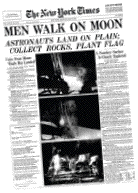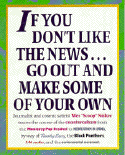
 Why I don't do interviews
Why I don't do interviews 
 I mentioned in an off-hand way that I don't do interviews. I thought I had written a piece that explains why, but I couldn't find it. Now I'll have one to point to if the question comes up again.
I mentioned in an off-hand way that I don't do interviews. I thought I had written a piece that explains why, but I couldn't find it. Now I'll have one to point to if the question comes up again. ![]()
First, I did press interviews for many years before deciding not to do them. I was never happy with the process, but considered them a necessity, mostly because I was either a company executive or product promoter, or both. By accepting their terms, my name would get more exposure, I would become more famous, and presumably more credible. Since my name was attached to a product, and it was attached to a business model, being interviewed was a way to make money, in theory.
However, there was a negative side -- they rarely carried my point of view accurately. My quotes almost always made it appear as if I believed things I didn't. Sometimes I was portrayed as believing the opposite of what I believed. So while I might have been furthering my financial cause, I was often hurting the cause of truth.
Then in 2002, something changed -- I left my company, and since then, have been involved on a consulting basis, from time to time, with other people's products. But, mostly, the financial incentive was gone.
Another thing happened a few years before that -- I started blogging, and thus had a way to get my name and ideas out there, without going through the press. And when I write, my words can express exactly what I believe, and when they don't, I can run a follow-up. I didn't realize it at first, but the success of my blog made it unnecessary for me to accept the problems with doing press interviews.
 Futher, I don't accept the theory of press interviews. Why should I give an exclusive to one reporter at the expense of all others? And why should I favor professionals over amateurs, over other bloggers? Why can't they read what I write on my blog, and choose soundbites from that material? They can, of course.
Futher, I don't accept the theory of press interviews. Why should I give an exclusive to one reporter at the expense of all others? And why should I favor professionals over amateurs, over other bloggers? Why can't they read what I write on my blog, and choose soundbites from that material? They can, of course.
Some of them don't like this, they think that in an interview they can catch people in lies. I've had them actually say this to me. In all the years I had been cooperating with reporters, not one has caught me in a lie, nor would they be likely to, if I was deceiving them. Mostly they are unprepared for the interview, often they're not even listening (or so it seems). They certainly don't know the subject well enough to catch a liar. They explain themselves as they were heroes, as Woodward or Bernstein chasing Watergate. I think it's ludicrous. I think they are incapable of getting original stories, and mostly rewrite press releases, and never take chances with the favor of companies they need access to, therefore the stories mostly come out the same. There isn't very much courage or depth in today's press. I might do interviews again if I got the idea that a reporter was doing something worthwhile with their franchise.
In the press there's a presumption that they're honest and you're not. I guess this, when I finally fully understood it, was what got me to stop helping them. I think even when I was in the role of a company exec, I was more honest than most of the reporters I tried to work with. There's certainly no cause to treat me, by default, as if I was dishonest. Even a small fry like me doesn't have to cooperate these days. Maybe that's the fundamental contradiction of journalism today.
It got comical at times, especially since I had absolutely no business interest in the things I was talking about. For me the light came on when I was being grilled by a reporter, asked the same question over and over, while talking about the gadgets used at a friends' wedding. I kept trying to say I was doing everyone a favor by talking with the reporter, I had nothing to gain by the interview. To prove it, I asked not to be quoted in the piece.
I was starting to feel like it was unnecessary and pointless, and had mostly stopped doing interviews. When I made an exception, I would get burned. So I stopped making exceptions.
These days, my policy re interviews is: 1. I don't do them. 2. If you want to tell me what you're interested in, I might write a blog post if I have something to say. You can quote the post freely, of course -- it's on the record and for attribution. 3. I might be willing to talk with you, but it will always be for background only. You can't quote anything I say. It'll be two equals having a discussion, not one person interviewing the other.
I made a different offer to Brendan Greeley of the Economist, a former colleague of mine at Berkman Center. I suggested he come on the weekly Rebooting the News podcast with myself and Jay Rosen. Most reporters wouldn't do this, not wanting to tip off their competitors. I never understood this, since they all write the same stories anyway. Rarely is there anything worth keeping secret, at least from my naive point of view. Brendan accepted, and he more or less got the interview he sought. It's a good show! And since it's all out there, we all win. No chance of me being misquoted. Of course when his story runs that's a whole other thing. We talk about that in the podcast. ![]() ">
">
Also, I'm always willing to do live radio. It has none of the disadvantages of a private interview. And if I want to I can turn it around and make it a discussion, as we did in yesterday's podcast.
 Should I be at the Apple store at 7AM on Thursday?
Should I be at the Apple store at 7AM on Thursday? 
 It's a long story but I'm one of the people who has an iPhone 4 reserved at the local Apple store. This time the people who opted for home delivery are getting theirs a day early. Last time around, with the iPad, I opted for home delivery and got it a few hours after the people who waited in line.
It's a long story but I'm one of the people who has an iPhone 4 reserved at the local Apple store. This time the people who opted for home delivery are getting theirs a day early. Last time around, with the iPad, I opted for home delivery and got it a few hours after the people who waited in line.
But this time I have to get in line. The question is should I be a total fanboy and be there at 6AM, lined up for the 7AM opening? Do I really have the fortitude and patience to wait in line, or should I show up at a reasonable hour, say 10AM or 11AM and wait in the line then. It's summer so it'll be much hotter later in the day. But maybe the line will be shorter? Maybe there won't be a line?
Questions. Questions. Of course I'd like to be among the first to have the phone, but that's not possible since the home folk are going to have it a day earlier than me.
 How naming will work with Twitter Annotations
How naming will work with Twitter Annotations 
 Annotations is a feature coming soon for Twitter that allows developers to attach arbitrary bits of metadata to tweets. I've written about this idea several times, most recently on April 9.
Annotations is a feature coming soon for Twitter that allows developers to attach arbitrary bits of metadata to tweets. I've written about this idea several times, most recently on April 9.
How Twitter can kill the Twitter-killers: "If I want to write an app for dogs who tweet, let me add a 'field' to a tweet called isDog, a boolean, that tells me that the author of the tweet is a dog. That way the dog food company who has a Twitter presence can learn that the tweet is from a dog, from the guy who's developing a special Twitter client just for dogs, even though Twitter itself has no knowledge of the special needs of dogs. We can also add a field for breed and age (in dog years of course). Coat type. Toy preference. A link to his or her owner. Are there children in the household?"
Almost as soon as it was announced, before any developers had actually used it, a concern was raised. How will the names be arrived at? And what happens if two developers use different names for the same idea? Based on this, they question the value of the entire architecture. How could it possibly work?
There is an answer to the question. We know how it will work because this is far from the first time the question has come up.
The answer is this: Developers will choose different names for the same idea. However, if the idea is important enough, and if an entity with a lot of users (and therefore a lot of tweets) gets involved, people will gravitate to the name that entity chooses.
This is one of the advantages of a corporate platform like Twitter. There is by default an entity with a lot of users -- Twitter. They basically have all the users. So the names they use will by default become the standard names. This is a very good thing, and no amount of FUD from bigger companies should stop them from exercising their eminent domain.
Further, in my April post, I suggested that "all the elements of the core namespace" be "reserved for Twitter. If you want to extend it, create a namespace and have a party."
 Now, it's reasonable to assume that Twitter won't want to get involved in every possible use of Annotations. In that case the chaos of the market and a sense of urgency will fill in. This happened in RSS, where there was a similar situation. Some developers even renamed ideas that were in the core namespace! Yes, it's a mess. But it worked anyway.
Now, it's reasonable to assume that Twitter won't want to get involved in every possible use of Annotations. In that case the chaos of the market and a sense of urgency will fill in. This happened in RSS, where there was a similar situation. Some developers even renamed ideas that were in the core namespace! Yes, it's a mess. But it worked anyway.
If there are two or three names for the same idea, guess what an enterprising developer does -- he or she supports all of them. In these cases Postel's Law advises: "Be liberal in what you accept and conservative in what you send." That's how long we've been having this re-invention problem, it goes all the way back to the founding of the Internet. Hey it probably goes back to biblical or even caveman days. The desire to take credit for other people's accomplishments is something that's been in our species for a long time.
I suspect the people who are casting stones at Twitter Annotations either don't have the experience to know that these things work themselves out if the incentives are strong enough, or have another agenda, like limiting the growth of the Twitter platform.
I suggest not worrying about it. If it turns into a problem, it will be because we found at least a few valuable applications for Twitter Annotations. In other words, it's a good problem to have. ![]() ">
">



